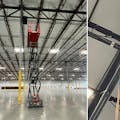Mesh Wi-Fi vs. Hardwired Systems: Optimizing Business Networks
Get Dependable Internet Access Throughout Your Whole Facility.

Many businesses ask us for help speeding up their internet connection. Frequently, this involves adding hardwired connections to replace Wi-Fi extenders and unnecessary mesh routers – or upgrading Wi-Fi access points with wired connections.
Popular mesh Wi-Fi systems can improve internet speed and access for home use but can often struggle in a business setting.
A hardwired network to connect desks, phones, essential devices, and Wi-Fi routers ensures reliable internet throughout your facility.
Plus, it’s easier than you think.
What Is a Mesh Wi-Fi System?
A Mesh Wi-Fi system is a wireless network created by combining a Wi-Fi router with one or more Mesh satellites set up throughout a home or building. These systems are ideal for larger homes where one Wi-Fi router does not cover the entire house.
In a mesh network, multiple nodes (routers or access points) work together to provide seamless Wi-Fi coverage over a larger area. These nodes communicate with each other wirelessly, creating a dynamic connection where data can travel through multiple nodes to reach its destination.
Mesh networks work smarter than regular Wi-Fi extenders because they can optimize the best path from a device to your base router to limit latency and improve reception.
Since homes are often constructed differently than office spaces (for example, homes often have thinner walls), a mesh network can more easily send and repeat data.
If your business has multiple floors or a large floor plan, a mesh network may struggle to maintain connections throughout the entire space.
Pros of Mesh Wi-Fi
- Scalability: Mesh systems can easily expand with the addition of satellites.
- Seamless Roaming: Devices can move between nodes without losing connection or needing to reconnect.
- Cost-Effective: Compared to wired networks, Mesh Wi-Fi can offer a lower up-front cost.
Cons of Mesh Wi-Fi
- Speed Variability: While Mesh Wi-Fi generally offers good coverage, speed can vary depending on the distance from the access points, potentially impacting bandwidth-intensive tasks.
- Interference: Business environments with numerous electronic devices and neighboring Wi-Fi networks may experience interference, affecting network performance.
- Blocked Signal: Business construction codes are different then residential codes. Walls are thicker than in homes, which can block the signal from a Mesh satellite, creating dead spots and/or a poor connection.
- Wi-Fi Based: Usually, only the base station has a wired connection to the internet modem, so you may be unable to utilize high-speed internet in many areas of your office if your mesh system has a maximum supported connection lower than your devices.
What Is a Hardwired Network System?
Hardwired network systems combine the benefits of modern Wi-Fi systems with the enhanced reliability and speed of a wired connection.
Using ethernet cabling to hardwire access points (APs) to your network creates several advantages over relying solely on wireless connections between nodes in a mesh Wi-Fi system. Let’s review them.
Pros of Hardwired Wi-Fi Networks & Systems
- High-Speed Connectivity: Ethernet connections ensure consistent high-speed data transfer, which is crucial for businesses handling large files, video conferencing, or cloud-based applications.
- Reduced Interference: Hardwiring eliminates common Wi-Fi interference issues, providing a stable and reliable network performance.
- Enhanced Security: Hardwired networks are inherently more secure than wireless networks, reducing the risk of unauthorized access or data breaches.
- Lower Latency: Wired connections generally have lower latency than wireless connections. This can be particularly beneficial for activities that require real-time data transmission, such as video conferencing.
- Enhanced Stability: Wired connections are less prone to issues affecting wireless signals, such as physical obstructions (walls, floors, furniture) and electromagnetic interference from other devices. This results in a more stable and reliable network.
- Better Coverage: With a wired backhaul, you can place access points in optimal locations without worrying about maintaining a robust wireless link between nodes. This allows for better overall coverage and signal strength throughout your business.
- Scalability: Adding more access points to a wired network is straightforward and doesn't negatively impact the performance of existing nodes. Adding more nodes in a wireless mesh system can sometimes lead to congestion and reduced performance if not managed properly.
Cons of Hardwired Networks
- Installation Complexity: Setting up a hardwired Mesh network may require more planning and effort. The good news is that most commercial buildings have drop ceilings and crawl spaces that are more easily accessible than residential buildings. This allows expert cable installers to easily hardwire an office.
- Initial Investment: Ethernet cabling, switches, and other hardware costs can be higher upfront than wireless-only Mesh systems. But you’ll likely save resources on maintenance and reduce your overall downtime.
How to Upgrade to a Hardwired Network System?
Consider Your Needs and Future Growth
Before any cable installation, we recommend considering what your company currently needs and what growth you expect. The more robust your system is from the outset, the easier it is to scale up your system.
Determine Your Hardwired Access Points
For the absolute best connection, you would run Cat6 cables to every phone, desk, and TV throughout your office. However, that’s not always a practical solution. Office and warehouse layouts often need to ebb and flow, and our team has the experience to design the most effective network for your business.
Our network cabling team can review your building’s structure to identify the most critical hardwired locations and plan a network to meet your needs today and scale as you grow.
We can leverage the power of modern Wi-Fi equipment, including business-grade routers and mesh systems, to boost your signal where needed so that your desks and common areas have the bandwidth you need to get work done.
Our expert technicians are ready to help your business if you have any questions.

